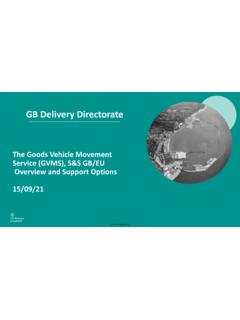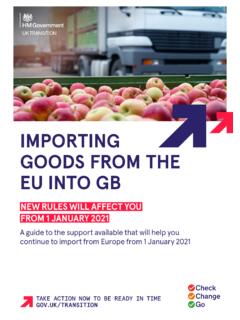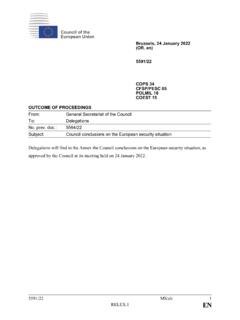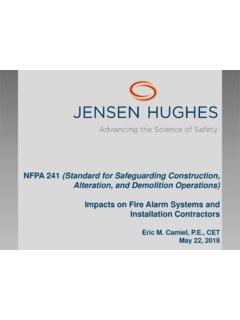Transcription of A Guide to Preparing to Become a Customs Agent
1 BIFA Good Practice Guide to Preparing to Become a Customs Agent A Guide to Preparing to Become a Customs Page 1 of 4In response to a high volume of queries about becoming a Customs Agent BIFA decided to prepare this guidance to assist those who would like to start operating as a Customs broker. Before traders can comfortably start Customs clearance operations there has to be an understanding of their duties, rights and obligations relative to the the legal aspects underpinning Customs clearance activities is equally as important as the commercial aspects and this publication guides traders through the basics of establishing a Customs clearance Customs Agent s main activitiesThe main function of a Customs Agent is to offer a professional Customs clearance and representation service to traders importing and/or exporting goods from/to countries outside the European primary activity for a Customs Agent is lodging import/export Customs declarations to
2 Customs (HMRC in the UK) and facilitating the payment of import duties, VAT, excise duty etc. on behalf of importers and exporters. For intra-EU movements, some Customs agents file their clients statistical data into Intrastat .Also, Customs agents frequently provide guidance and, in some cases, consultancy services to their clients covering the legal aspects and procedures governing Customs activities. Due to their broad knowledge Customs agents often offer general guidance on subjects as diverse as: Phytosanitary or veterinary requirements Pharmaceutical or technical regulations Quantitative quotas Licencing requirements Dual use goods advice Market protection and access regulations Trading Standards requirements.
3 Are Customs agents licensed in the UK?There are no licensing requirements in the UK for a trader to establish themselves as a Customs Agent . A Customs Agent s work is regulated by the complex laws specific to the Customs clearance and import/export main document detailing Customs and other regulatory activities is The Integrated Tariff of the United Kingdom (The Tariff). This provides an invaluable Guide to the overall Customs function and also the role of various parties within formal training is required to act as a Customs Agent ?In the UK no formal training or qualifications are officially required in order to Become a Customs Agent .
4 BIFA recommends that, due to the complexity of the operations, the legal obligations and potential to be fined, candidates aspiring to Become Customs agents demonstrate a sound understanding of Customs law and other regulations. They must understand their rights and the legal obligations that they will be governed the complex nature of the subject matter some professional tuition is highly desirable and recommended. In addition to that, HMRC and other government agencies may expect a certain level of certified training and/or experience in order for agents to apply for certain types of authorisations or facilitations.
5 In particular this applies to agents wishing to Become Authorised Economic Operators where there are specific requirements relative to experience or training (See BIFA s Guide for AEO Applicants).There is a wide choice of training available in all aspects of the freight industry including Customs , and even individuals with years of experience may find that training courses will enable them to fill in the gaps in their current knowledge. For more details see: List of BIFA is a wide choice of training available in all aspects of the freight industry including Customs .
6 For more details click Guide to Preparing to Become a Customs Page 2 of 4 THE LAWD espite the fact that no formal licensing regime applies, a Customs Agent s work is highly controlled and is subject to a wide range of regulations. Understanding these is key to becoming a successful and compliant trader able to provide good quality services to customers. The Tariff The Integrated Tariff of the United Kingdom is the basis for every Customs Agent s clearance activities. As previously stated in this document, The Tariff details the regulatory requirements applicable to Customs declarations including Customs Procedure Codes (CPCs), rules of completion, documentary requirements, commodity codes Tariff comprises 3 volumes and as a Customs Agent you have a copy either electronically or in hard 1 provides detailed information for importers and exporters covering prohibitions and restrictions, reliefs, duties, suspensions, and VAT regulations.
7 It also covers other applicable charges and rules that traders need to apply when importing or exporting from the UK. Volume 3 brings together instructions for completing the Single Administrative Document (form C88) and related Customs includes import, export and community transit documentary procedures, information about Customs warehousing, trader data input, details of Customs procedure codes and certain other special procedures for facilitating 2 contains the Harmonised System (HS) based nomenclature, codes and rates of duty including within the Schedule the descriptions, codes and rates relating to preferences, quotas, suspensions and anti-dumping duties, together with details on excise duties and drawbacks.
8 It also incorporates detail of other tariff related measures included in the EU s Integrated Tariff (TARIC) together with an indication of liability to value added tax (VAT) of goods Union Customs Code (UCC)The Tariff setting out the general rules for importing and exporting goods is derived from the Union Customs Code EU Regulation 952/2013. The UCC is supported by the Implementing Act and Delegating regulations which further specify the scope of legislation applicable to import/export/transit etc. and provide technical information relative to the legislation.
9 The UCC has been implemented across the EU since the 1st May 2016 and this process has been ongoing and has driven some significant Customs procedures, especially relative to Customs declaration procedures. A Customs Agent will need to understand the UCC and accompanying legislation in order to fulfil their role is responsible for Customs clearance instructions?A Customs Agent deals with a variety of products entered to various Customs procedures and operates on the basis of clearance instructions received from the importers/exporters. For example, it is the importer s/exporter s legal responsibility to provide the Tariff classification of the instructions may be of permanent (standing) nature (usually applicable to one type of goods imported/exported from/to the same trader) or specific where they would be applied on an individual shipment basis only.
10 It is important for clearance agents to ensure instructions are always available and detailed, because they may be requested by Customs . It is crucial that agents understand how to read these instructions particularly in combination with various types of shipping documents accompanying the freight. We must emphasise that being an Agent doesn t automatically make you the importer/exporter and all the information relative to Customs clearance should be provided by the trading party, on whose behalf you are acting. However, in certain circumstances the Customs Agent may Become the declarant which imposes greater responsibilities and thus liabilities.








